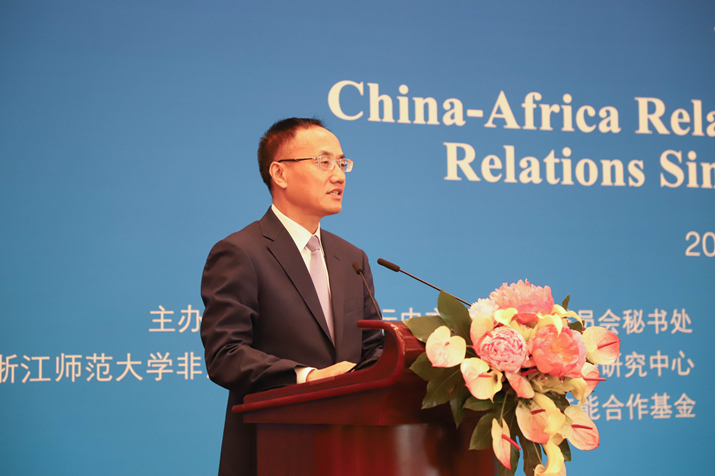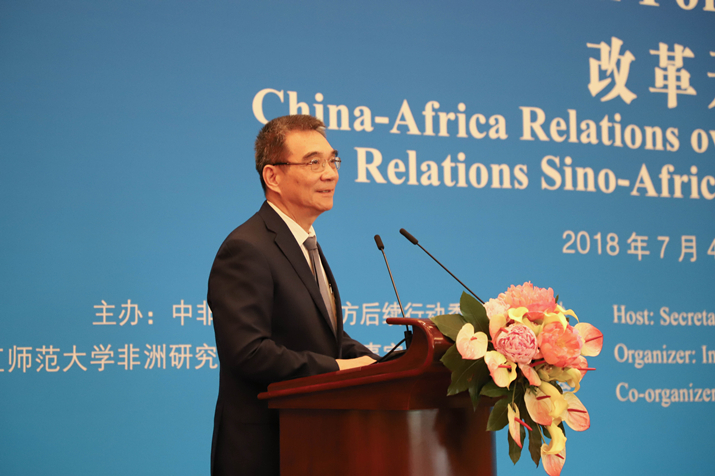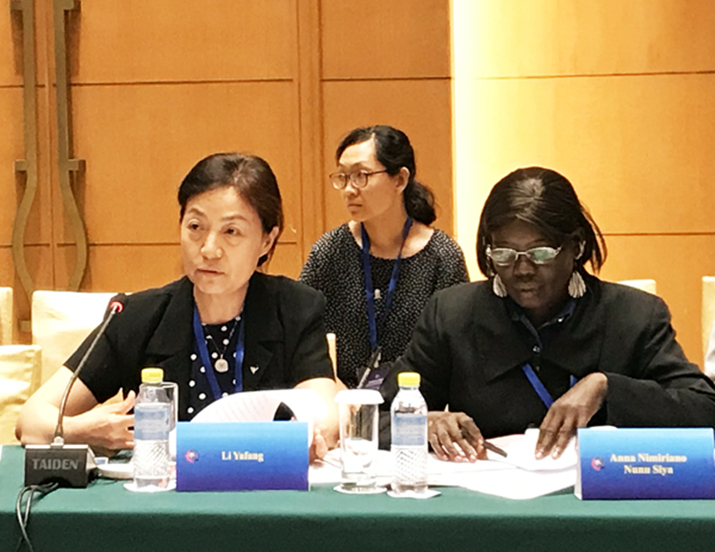|
||||||||||
| Home Nation World Business Opinion Lifestyle ChinAfrica Multimedia Columnists Documents Special Reports |
|
||||||||||
| Home Nation World Business Opinion Lifestyle ChinAfrica Multimedia Columnists Documents Special Reports |
| ChinAfrica |
| Progress Toward Shared Development |
| China’s 40 years of reform and opening up can lend experience to African countries |
| By Xia Yuanyuan ·2018-07-05 |

Chen Xiaodong, Assistant Minister of Foreign Affairs, at the Seventh Meeting of China-Africa Think Tanks Forum (Photo by Fang Yicong with Institute of African Studies of Zhejiang Normal University
“In the past 40 years, China and several African countries have made remarkable progress hand in hand. The two sides have enhanced political mutual trust since China’s reform and opening up,” said Chen Xiaodong, Assistant Minister of Foreign Affairs, at the Seventh Meeting of the China-Africa Think Tanks Forum held in Beijing.
The year 2018 marks the 40th anniversary of China’s reform and opening up. During this period, China achieved its own rapid development, and also committed to building a common future for human peace and development. Just as Chinese President Xi Jinping pointed out at the opening of the Boao Forum for Asia in April, over the past four decades, China has embraced the world with open arms and actively contributed its share to the world. Reform and opening up is a great process that has seen China and the world, especially China and African countries, achieve development and progress together.
Over the past 40 years, China-Africa economic and trade cooperation has achieved leap-forward development. The trade volume between China and Africa increased more than 200 times from $765 million in 1978 to over $170 billion in 2017. China has maintained its position as Africa’s largest trade partner for many years.
“China’s 40 years of opening up have made remarkable achievements that have attracted the attention of the world. The experience proved to be invaluable to developing countries, especially African countries,” said Mohamed Fayez Farahat Mahmoud, Senior Researcher of Ahram Center for Political and Strategic Studies in Egypt.

Justin Yifu Lin, Counselor of the State Council of China and Dean of the Institute of New Structural Economics at Peking University (Photo by Fang Yicong with Institute of African Studies of Zhejiang Normal University
In summing up China’s development experience, Justin Yifu Lin, Counselor of the State Council of China and Dean of the Institute of New Structural Economics at Peking University, said that the reason why China has achieved such a great success after 1978 is because of its changing thought of development. In the past, when pursuing the modernization, African countries usually acquired experience and theory from developed countries. However, as an old Chinese saying goes, the tasty orange grown in south China would turn sour once it is grown in the north. The situation between developed countries and African countries are totally different.
In fact, the preconditions in Africa are similar to those in China. Therefore, the experience accumulated during the 40 years of China’s reform and opening up and the theory it has formed will have greater reference value for African countries and other developing countries, according to Lin.
At present, the infrastructure in most African countries is relatively poor, which is the bottleneck of economic development. Lin believes that the Belt and Road Initiative will be an important opportunity for African countries to solve the bottlenecks and achieve industrialization.
In addition to economic cooperation and development, in the context of the current international situation, the competition for international discourse rights has become more intense, and China-Africa relations and cooperation have also faced a more complicated public opinion environment.
Chen suggested that China and African media should tell their story from their own perspective when responding to Western media, especially in cases where coverage is biased. 
Li Yafang (left), President of Beijing Review (Photo by Xia Yuanyuan)
Li Yafang, President of Beijing Review, believes that Chinese and African media should seek common ground and put aside differences while respecting cultural diversity. She suggested Chinese and African media increase cooperation and exchanges so as to promote mutual understanding of peoples in China and Africa.
|
||
| About Us | Contact Us | Advertise with Us | Subscribe |
| Copyright Beijing Review All rights reserved 京ICP备08005356号-5 京公网安备110102005860号 |